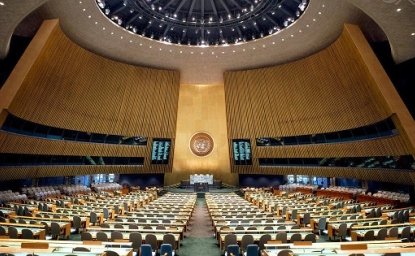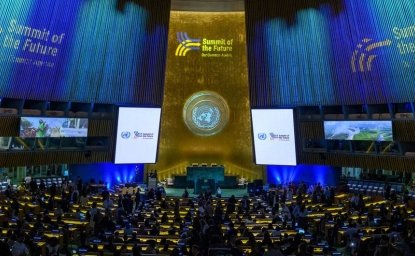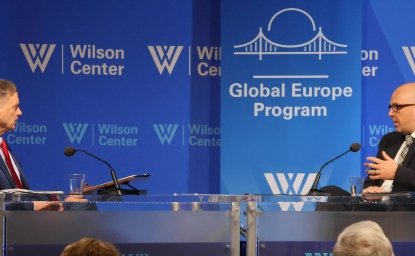From 2019-2020, South Africa re-joined the global high table for its third term on the United Nations Security Council (UNSC). This occurred at a time when the effectiveness of multilateralism has increasingly been questioned, and the commitment to global, rules-based systems and institutions has come under growing strain.
The conclusion of South Africa’s third term on the UNSC marks a high point in the ongoing formulation of the country’s foreign policy. Key developments that occurred between Pretoria and New York during the two-year period shed light on the evolution of South African multilateralism, and the country’s commitment toward playing a robust and visible leadership role on collective African peace and security issues. For current and future African members, a number of useful lessons are to be gleaned from South Africa’s experience.
South Africa’s term was a critical opportunity for the country to showcase its foreign-policy priorities. These included affirming its campaign pledge to build bridges between different Council blocks, and advocate for a strengthened and representative, rules-based global order.
South Africa joined the group of the elected UNSC members (the E10) with a particular focus on strengthening the voices of the three African members of the UNSC (the A3). Over the past decade, the E10 gained prominence in driving new ideas; pushing for reform of UNSC working methods; attempting to break geopolitical divides; and championing a more effective and equitable division of labor among Council members.
From 2019–2020, the UNSC saw sharp political divisions among its members—particularly among the permanent members (the P5). This, in turn, reflects broader global political divisions. Collectively, these differences have eroded not just confidence in multilateral responses, but also their effectiveness in mitigating peace and security threats.
The effectiveness of the Council has been undermined by the growing lack of consensus between (and often within) the so-called P3 (the United States, United Kingdom, and France) on the one hand, and Russia and China on the other. There has been a notable deterioration of cordial working relations and agreement on Council files that historically enjoyed consensus among the permanent member states.
Given this lack of consensus, unified A3 positions have increasingly been used to ensure that African voices exercise influence in breaking peace and security deadlocks. This process has been led, in particular, by South Africa—drawing on previous lessons learnt. This could also be seen in the way the country prioritized joint positions with the two other elected African Council members and the way it promoted coherence between African common positions stemming from the African Union (AU) on UNSC agenda items.
South Africa, together with other A3 members, played a leading role in building consensus and bridging competing positions in the Council—particularly in how it responds to African crises. This enhanced the influence of the A3 to support more effective unified responses in a significant and unprecedented way. For South Africa, this was critical in advancing its stated commitment to prioritizing regional peace and security by strengthening linkages between the UN and relevant African bodies.
The elements of planning and human resources play a central role in any country’s UNSC membership. While it may appear to be a bureaucratic approach, South Africa’s experience clearly showed that when countries have their house in order, they are able to achieve more. It is key for UNSC members to have effective administrative systems, deploy committed personnel, and implement an optimal division of labor—all coupled with coherent political and operational strategies.
Encouragingly, South Africa’s 2019-2020 term benefited tremendously from institutional memory that had been accumulated following its two prior terms. Before joining the Council in 2019, South Africa had, remarkably, been a member twice in fewer than 10 years (from 2007-2008, and again from 2011-2012). This experience afforded the country a degree of familiarity in understanding the “rules of the game” and Council procedures, based on its existing knowledge of political and institutional dynamics. South Africa’s recent term was also bolstered by its reliance on diplomats with extensive multilateral knowledge and prior UNSC working experience.
South Africa’s perceived responsiveness to peace and security developments on the Council’s agenda also benefited from an active and proactive public-diplomacy approach, especially when compared to the country’s prior terms. The willingness of South African diplomats to engage with media and civil society served the country well, particularly in its defense of controversial positions adopted throughout its two-year term. This was coupled with an increasingly active online and social media presence, which should continue to be refined and leveraged in future multilateral appointments.
Another lesson relates to how key issues, themes, and country files were prioritized. By directing its diplomatic resources to the central work of the Council, South Africa was also able to focus on key thematic and country-specific priorities—particularly those related to the African continent.
Files like the Democratic Republic of the Congo, South Sudan, Sudan, and Libya were central to South Africa’s approaches, often highlighting the need for stronger AU participation in peace processes. From a thematic point of view, an example of South Africa’s role can be seen in its work on Women, Peace, and Security (WPS). In October 2019, the country led the negotiation of resolution 2493. Following the difficult negotiations led by Germany in April 2019, South Africa’s efforts saw a return of unanimous voting on WPS resolutions. However, South Africa's stance did not always reflect the most popular position or approach to the matter. In October 2020, the country was caught in the middle of some controversy for voting in favor of a Russian-led draft resolution to commemorate the 20th anniversary of Resolution 1325, which was eventually not approved.
Yet, in spite of its active role on African files and certain thematic areas, South Africa was less visible (and accordingly perceived as less adaptable) when it came to some key non-African Council files. These included issues surrounding humanitarian access in Syria and broader E10 cohesion. This possibly reflected a selective appetite for risk-taking, reserving this for positions that related directly to key foreign-policy priorities.
South Africa attained a good degree of visibility during its Council membership and was able to champion African positions. While its term also saw a number of shortfalls, other African states will benefit from looking at South Africa’s experience in planning, preparing for, and implementing their membership on the UNSC.
Gustavo de Carvalho is a Senior Researcher at the Institute for Security Studies (ISS), in Pretoria, South Africa
Priyal Singh is a Researcher at the Institute for Security Studies (ISS), in Pretoria, South Africa
This article was written under the context of an ISS project funded by the Canada Fund for Local Initiatives.
Authors

Africa Program
The Africa Program works to address the most critical issues facing Africa and US-Africa relations, build mutually beneficial US-Africa relations, and enhance knowledge and understanding about Africa in the United States. The Program achieves its mission through in-depth research and analyses, public discussion, working groups, and briefings that bring together policymakers, practitioners, and subject matter experts to analyze and offer practical options for tackling key challenges in Africa and in US-Africa relations. Read more

Explore More
Browse Insights & Analysis
Iraq Should Consider Extending UNAMI’s Mission

Latin American Leaders in the Gran Manzana


